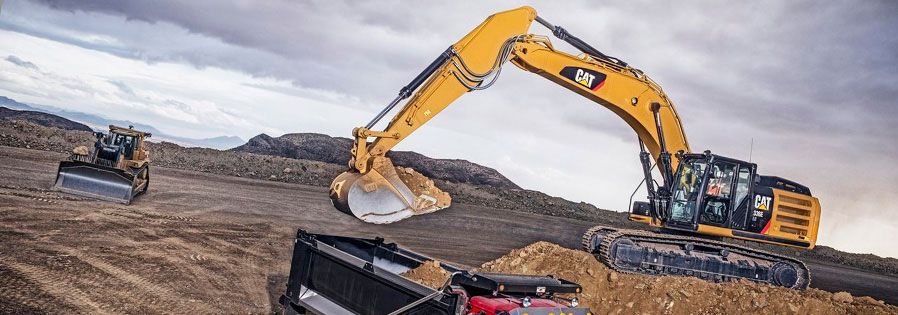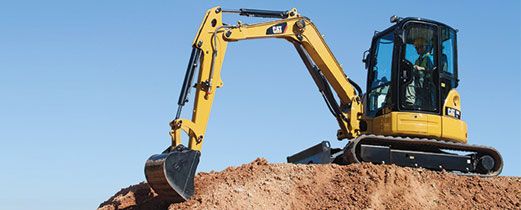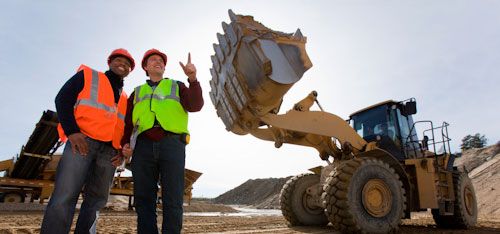A Guide to Renting Heavy Equipment and Avoiding Mistakes

Heavy equipment rental is a phenomenon that has developed considerable legs. In the past decade the instances of companies renting rather than buying the construction equipment they need has gone through the roof. But why is that? The answer to that question is the same one that drives nearly all other business considerations: the bottom line. In short, many companies are no longer thrilled by the prospect of buying equipment and then letting it molder in the yard between projects. In their search for more cost-effective alternatives they cast their eye upon the rental landscape and see clear advantages that are hard to resist.
For instance: when you rent heavy equipment on an as-needed basis you can often deduct rental fees immediately as a business expense instead of trudging the long dusty road of depreciation. You are also free to “upgrade” your equipment whenever you wish so you’re always arriving on the job with the best, most energy efficient, most capable equipment available. Certainly anyone can see the advantage of that. There’s also the fact that you free yourself from the often crippling cost of maintaining older equipment as well as the fact that you don’t need to pay to store the equipment while it molders.
Renting however is not a strategy without its risks. Below we’re going to look at some of the most common mistakes companies make with heavy duty rental equipment and suggest some ways you may be able to avoid those mistakes.
Putting Yourself at a Disadvantage Out of the Blocks
Some renters put themselves behind the 8 ball before they even get the equipment to the job site. Here are 4 critical but all-too-common mistakes renters of heavy equipment are prone to making that can and often do compromise the job before it gets underway.

Not Reading the Contract Thoroughly – This is a classic that ensnares just about everyone at some point. Companies, in their rush to cash in on what they see as the advantages of renting equipment rather than buying it, neglect to read the fine print regarding things like fuel and delivery charges as well as late fees. They also don’t understand, or simply forget, that a rental company may have a different definition of ‘damage’ than they do. If they’ve owned their own equipment for years they’re likely in the habit of disregarding the dings and scrapes that come with the job. The rental company is likely not so accepting or forgiving. It’s often the little things that create red ink.
Beware of Discounts – Some rental companies will offer deep discounts on certain pieces of equipment in order to generate business. But these pieces of equipment are often the oldest and may have checkered maintenance histories as well. If your excavator rental breaks down and everything grinds to a halt all your precious savings wind up evaporating in a fog of angry phone calls. The moral? Discounts are great as long as they’re not traps. Be careful to only to do business with companies that have an established reputation for renting dependable equipment and providing responsive customer service.
Renting More or Less Than You Need – Some companies waste money by renting more equipment than they need to get the job done. Do you really need that Deere 333G or will a smaller 317G do the job just fine? You could also wind up wasting money by renting a front end loader or mini excavator that’s too small for the job and slows everything down. In this case the onus is squarely on the renter who needs to do his research before he approaches the rental company looking to procure equipment.
Failure to Sync – Do you really need that specific piece of equipment right now? Or are there other tasks that need to be completed first before the rental equipment will be called upon? Always make sure your construction timelines and your rental timelines are in sync or you could wind up burning through money and ruing the day you decide to rent instead of buy.
How to Ensure Safety with Heavy Equipment Rental

One of the most common mistakes first time renters make with heavy equipment is paying only scant attention to safety issues. Experienced companies by contrast understand the value of putting safety first and also understand that the most important word in the construction business is “liability”. People new to the business, whose business plan calls for renting equipment, may have little appreciation for this fact. They assume their operator is up to snuff, that everyone will use common sense to avoid accidents and that safety briefings are a kind of overkill that can undermine productivity. They’re not. Here are some best practices that demonstrate how to avoid the kind of mistakes that can quickly turn a profitable job into a blizzard of red ink.
-
Make sure every piece of equipment is in prime condition before you start. Each operator should have a checklist to go over and sign off on before work commences.
-
Heavy equipment often has substantial blind spots that can cause serious accidents. To neutralize this weakness make sure each piece of heavy equipment has a spotter assigned to direct the operator when backing up or performing other risky maneuvers.
-
Make sure nothing is ever dumped from the bucket until the intended dumping area is completely clear. You’d be surprised how often people get hurt because they were in the wrong place when an operator decided to discharge their load.
-
Always stay within the operating limits of the machinery. Not only will this allow you to minimize risk it will also prevent you from violating the rental agreement and incurring potential liability.
-
Make sure everyone on site is wearing correct clothing with bright, reflective colours and that the work area is clearly defined with large easy to read signs.
-
Make sure every operator is familiar with the parking brake.
If you read that how-to list and thought that most of those points could be addressed during employee training, congratulations. You’re right. Employee training is the place to drive all of those points home and all operators should be compelled to attend regular training and safety sessions.
Avoiding heavy duty rental equipment mistakes then isn’t rocket science but it does require a commitment to safety that takes precedence over other concerns. Well trained employees always make sure the equipment is ready to go before work commences, that a safe work environment is maintained for all concerned and that best operational practices are used to avoid errors that could unleash the liability dragon.

